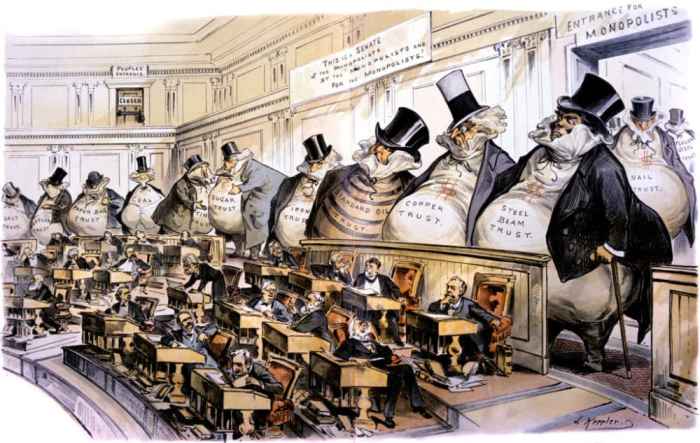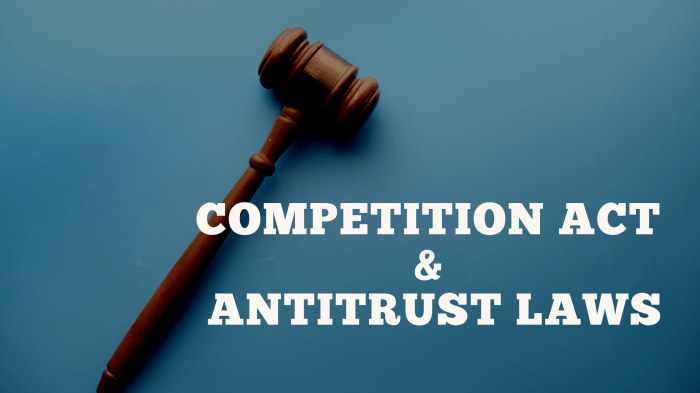
- Introduction to Antitrust Law
- Goals and Objectives of Antitrust Law
- Key Antitrust Laws and Regulations
- Types of Antitrust Violations
- Antitrust Enforcement and Agencies
- Impact of Antitrust Law on Business
- Current Antitrust Issues and Debates: What Is Antitrust Law
- Future Directions in Antitrust Law
- Closure
- Questions and Answers
What is antitrust law? It’s a powerful tool that ensures a level playing field for businesses and safeguards consumers from unfair practices. Antitrust law prevents monopolies and promotes healthy competition, ensuring that markets function efficiently and fairly.
This branch of law has a long history, dating back to the late 19th century when the rise of powerful trusts threatened to stifle competition. Landmark cases like the Standard Oil and AT&T antitrust actions solidified its importance, shaping the economic landscape and protecting consumers from predatory practices.
Introduction to Antitrust Law

Antitrust law, also known as competition law, is a collection of legal rules and regulations that aim to promote fair competition in the marketplace. Its primary objective is to prevent anti-competitive practices, such as monopolies and cartels, that can harm consumers by restricting choices, increasing prices, and stifling innovation.
Historical Context and Origins
Antitrust law has its roots in the late 19th century, during the era of rapid industrialization in the United States. As large corporations gained significant market power, concerns arose about their potential to exploit consumers and stifle competition. This led to the passage of the Sherman Antitrust Act of 1890, the first federal law in the United States aimed at regulating monopolies and other anti-competitive practices.
The Sherman Act was followed by the Clayton Antitrust Act of 1914 and the Federal Trade Commission Act of 1914, which further strengthened and clarified the legal framework for antitrust enforcement. These early antitrust laws laid the foundation for a robust system of competition law that has evolved over the decades.
Definition and Core Principles
Antitrust law is a complex and multifaceted area of law, but its core principles can be summarized as follows:
- Promoting Competition: Antitrust law seeks to foster a competitive marketplace where businesses compete on the merits of their products and services, rather than through anti-competitive practices.
- Preventing Monopolies: Monopolies, where a single firm controls a significant portion of the market, can stifle competition and harm consumers. Antitrust law aims to prevent monopolies from forming or abusing their market power.
- Combating Cartels: Cartels are agreements between competing firms to fix prices, limit output, or allocate markets. Such agreements are illegal under antitrust law because they eliminate competition and harm consumers.
- Protecting Consumers: Antitrust law ultimately seeks to protect consumers by ensuring they have access to a wide range of choices, fair prices, and innovative products and services.
Early Antitrust Legislation and Landmark Cases
The Sherman Antitrust Act of 1890 is considered the cornerstone of U.S. antitrust law. This landmark legislation prohibited “every contract, combination in the form of trust or otherwise, or conspiracy, in restraint of trade or commerce among the several States, or with foreign nations.”
The Clayton Act of 1914 further expanded the scope of antitrust law by prohibiting specific anti-competitive practices, such as price discrimination, tying arrangements, and exclusive dealing agreements. The Federal Trade Commission Act of 1914 established the Federal Trade Commission (FTC), an independent agency with broad authority to enforce antitrust laws and prevent unfair and deceptive business practices.
Some notable landmark cases that shaped the development of antitrust law include:
- Standard Oil Co. of New Jersey v. United States (1911): This case resulted in the breakup of the Standard Oil Company, which had monopolized the oil refining industry. The Supreme Court ruled that the company’s actions violated the Sherman Act and established the “rule of reason” standard for analyzing antitrust violations.
- United States v. American Tobacco Co. (1911): Similar to the Standard Oil case, this case led to the breakup of the American Tobacco Company, which had a monopoly in the tobacco industry. The court applied the “rule of reason” and found that the company’s actions were in restraint of trade.
- United States v. Aluminum Co. of America (1945): This case established the “Alcoa” doctrine, which held that a firm with a dominant market share could be found guilty of monopolization even if it did not engage in predatory or anti-competitive conduct. The court ruled that Alcoa’s control over the aluminum market was a violation of the Sherman Act.
Goals and Objectives of Antitrust Law
Antitrust law, also known as competition law, is a collection of laws designed to promote fair competition in the marketplace. The primary objective of antitrust law is to protect consumers from anti-competitive practices that can harm their interests.
Promoting Competition
Antitrust law aims to promote competition by preventing anti-competitive practices that can stifle innovation, reduce consumer choice, and lead to higher prices. This goal is achieved through various mechanisms, including:
- Prohibiting monopolies and cartels: Antitrust laws prevent companies from gaining excessive market power that allows them to dictate prices and restrict competition.
- Preventing mergers and acquisitions that harm competition: Antitrust laws review proposed mergers and acquisitions to ensure they do not create or enhance market dominance that could lead to higher prices or reduced consumer choice.
- Enforcing fair trading practices: Antitrust laws prohibit companies from engaging in unfair or deceptive business practices, such as price fixing, bid rigging, and market allocation.
Protecting Consumers
Antitrust law aims to protect consumers by ensuring they have access to a variety of products and services at fair prices. This goal is achieved by:
- Ensuring fair pricing: Antitrust laws prevent companies from engaging in price-fixing or other practices that artificially inflate prices.
- Promoting product variety and innovation: Antitrust laws encourage competition, which leads to a wider range of products and services, and incentivizes innovation.
- Preventing deceptive business practices: Antitrust laws protect consumers from being misled by deceptive advertising or other unfair business practices.
Preventing Monopolies
Unchecked market dominance, or a monopoly, can have detrimental consequences for consumers and the economy. Antitrust laws seek to prevent monopolies by:
- Breaking up existing monopolies: In cases where a company has achieved an excessive market share, antitrust laws may require the company to divest itself of certain assets or operations to restore competition.
- Preventing the formation of monopolies: Antitrust laws scrutinize mergers and acquisitions that could lead to the creation of a monopoly.
- Regulating monopolies: Even if a monopoly is deemed unavoidable, antitrust laws may impose regulations on the monopolist to prevent it from abusing its market power.
Consequences of Unchecked Market Dominance
The potential consequences of unchecked market dominance are significant.
- Higher prices: Monopolists can charge higher prices than they would in a competitive market, as consumers have limited alternatives.
- Reduced product variety: Monopolists may have less incentive to innovate or offer a wide range of products, as they face little competition.
- Lower quality: Monopolists may be less motivated to improve product quality, as consumers have fewer choices.
- Stifled innovation: Monopolists can stifle innovation by acquiring or suppressing potential competitors.
- Reduced economic efficiency: Monopolies can lead to inefficiencies in resource allocation, as they may not be as responsive to market signals as competitive firms.
Key Antitrust Laws and Regulations
Antitrust laws are designed to promote competition and prevent monopolies in the marketplace. They aim to protect consumers from unfair business practices and ensure a level playing field for businesses. These laws are enforced by government agencies, such as the Federal Trade Commission (FTC) and the Department of Justice (DOJ) in the United States, and by similar agencies in other countries.
Antitrust Laws in the United States
The United States has a long history of antitrust legislation, dating back to the late 19th century. The following table summarizes some of the key federal antitrust laws:
| Law Name | Year Enacted | Key Provisions | Examples of Enforcement Actions |
|---|---|---|---|
| Sherman Antitrust Act | 1890 |
|
|
| Clayton Antitrust Act | 1914 |
|
|
| Federal Trade Commission Act | 1914 |
|
|
| Robinson-Patman Act | 1936 |
|
|
| Hart-Scott-Rodino Antitrust Improvements Act | 1976 |
|
|
Antitrust Laws in Other Jurisdictions
Antitrust laws are also common in other countries, although the specific provisions and enforcement mechanisms may vary. Some examples of international antitrust laws include:
- European Union: The European Union’s competition law is governed by the Treaty on the Functioning of the European Union (TFEU) and by a number of regulations and directives. The European Commission is responsible for enforcing competition law. The TFEU prohibits agreements between companies that restrict competition, abuses of a dominant market position, and mergers that would significantly impede effective competition. The Commission has the power to impose fines on companies that violate competition law.
- Canada: Canada’s competition law is governed by the Competition Act. The Act prohibits agreements between companies that restrict competition, abuses of a dominant market position, and mergers that would substantially lessen competition. The Competition Bureau is responsible for enforcing the Act.
- China: China’s antitrust law is governed by the Anti-Monopoly Law (AML). The AML prohibits agreements between companies that restrict competition, abuses of a dominant market position, and mergers that would eliminate or restrict competition. The State Administration for Market Regulation (SAMR) is responsible for enforcing the AML.
Types of Antitrust Violations

Antitrust law aims to prevent anti-competitive practices that harm consumers and businesses. These violations can be categorized into various types, each with specific characteristics and potential consequences.
Types of Antitrust Violations
Antitrust violations are broadly classified into three main categories: price fixing, market allocation, and monopolization. These violations are further explained in the table below:
| Violation Type | Description | Examples | Penalties |
|---|---|---|---|
| Price Fixing | Agreements between competitors to set prices, discounts, or other terms of sale at a certain level. This can include agreements to:
|
|
|
| Market Allocation | Agreements between competitors to divide markets, customers, or territories among themselves. This can include agreements to:
|
|
|
| Monopolization | The act of a single company gaining exclusive control over a market, often through anti-competitive practices. This can include:
|
|
|
Antitrust Enforcement and Agencies

Antitrust laws are not self-enforcing. Enforcement of antitrust laws is the responsibility of specialized government agencies. These agencies investigate potential violations, pursue legal action against violators, and promote compliance with antitrust regulations.
Role of Antitrust Enforcement Agencies
The primary agencies responsible for enforcing antitrust laws in the United States are the U.S. Department of Justice (DOJ) and the Federal Trade Commission (FTC). Both agencies have broad authority to investigate and prosecute violations of antitrust laws.
- U.S. Department of Justice (DOJ): The DOJ’s Antitrust Division is responsible for enforcing federal antitrust laws. The DOJ investigates and prosecutes companies that engage in anticompetitive practices, such as price-fixing, bid-rigging, and market allocation. The DOJ also reviews mergers and acquisitions to ensure they do not harm competition.
- Federal Trade Commission (FTC): The FTC is an independent agency that has broad authority to investigate and prosecute violations of antitrust laws. The FTC focuses on a wide range of anticompetitive practices, including deceptive advertising, unfair competition, and consumer protection. The FTC also reviews mergers and acquisitions to ensure they do not harm competition.
Investigative and Enforcement Processes
Antitrust enforcement agencies use a variety of investigative and enforcement tools to ensure compliance with antitrust laws.
- Investigations: Both the DOJ and FTC have the authority to conduct investigations into potential antitrust violations. These investigations can be initiated based on complaints from consumers, competitors, or other sources. The agencies can use a variety of investigative techniques, including:
- Civil Investigative Demands (CIDs): CIDs are formal requests for documents and information from companies or individuals.
- Subpoenas: Subpoenas are legal orders that compel witnesses to testify or produce documents.
- Search Warrants: Search warrants allow agencies to search for evidence of antitrust violations.
- Enforcement Actions: If an agency determines that a violation of antitrust law has occurred, it can take a variety of enforcement actions, including:
- Consent Decrees: Consent decrees are agreements between the agency and the violator that resolve the antitrust violation.
- Civil Lawsuits: Agencies can file civil lawsuits against violators to seek monetary damages and injunctive relief.
- Criminal Prosecutions: In some cases, the DOJ can pursue criminal prosecutions against individuals or companies that violate antitrust laws.
Recent Antitrust Investigations and Enforcement Actions
Antitrust enforcement agencies are actively involved in investigating and prosecuting antitrust violations. Here are some recent examples:
- Google: In 2020, the DOJ filed an antitrust lawsuit against Google, alleging that the company monopolized the digital advertising market. The lawsuit alleged that Google used its dominance in search and advertising to stifle competition.
- Facebook: In 2020, the FTC filed an antitrust lawsuit against Facebook, alleging that the company illegally acquired Instagram and WhatsApp to eliminate competition. The lawsuit alleged that Facebook’s acquisitions harmed competition and innovation in the social media market.
- Pharmaceutical Companies: In recent years, the DOJ and FTC have investigated and prosecuted pharmaceutical companies for engaging in price-fixing and other anticompetitive practices. These investigations have resulted in significant fines and settlements.
Impact of Antitrust Law on Business
Antitrust law plays a crucial role in shaping the competitive landscape for businesses of all sizes and across various industries. It aims to prevent anti-competitive practices that can harm consumers and stifle innovation. This section delves into the implications of antitrust law for businesses, analyzing the challenges and opportunities it presents.
Impact on Businesses of Different Sizes and Industries
Antitrust law has a significant impact on businesses of all sizes, from small startups to multinational corporations.
- Small Businesses: Antitrust laws can benefit small businesses by promoting fair competition and preventing larger companies from engaging in practices that could stifle their growth. For example, antitrust laws can protect small businesses from predatory pricing or exclusive dealing agreements that could limit their access to customers or suppliers.
- Large Businesses: Large businesses face greater scrutiny under antitrust law, as their actions can have a more significant impact on the market. They must be mindful of their pricing strategies, mergers and acquisitions, and other business practices to avoid violating antitrust regulations. Antitrust laws can also prevent large businesses from using their market power to unfairly disadvantage smaller competitors.
- Specific Industries: Different industries are subject to different antitrust regulations depending on their market structure and competitive dynamics. For example, industries with high barriers to entry, such as telecommunications or pharmaceuticals, may be subject to stricter antitrust scrutiny.
Challenges Presented by Antitrust Law
Antitrust law presents several challenges for businesses, including:
- Compliance Costs: Complying with antitrust regulations can be costly for businesses, particularly for large companies with complex operations. They may need to invest in legal counsel, training, and internal compliance programs to ensure they are meeting the requirements of antitrust laws.
- Uncertainty and Risk: Antitrust laws are complex and subject to interpretation. Businesses may face uncertainty about what constitutes an antitrust violation, increasing the risk of legal action.
- Competitive Restraints: Antitrust laws can limit certain business practices that could potentially benefit consumers, such as mergers or joint ventures.
Opportunities Presented by Antitrust Law
Despite the challenges, antitrust law also presents opportunities for businesses:
- Level Playing Field: Antitrust laws create a level playing field for businesses by preventing anti-competitive practices that can give some companies an unfair advantage. This promotes innovation and competition, which benefits consumers.
- Increased Efficiency: Antitrust laws can encourage businesses to operate more efficiently by preventing them from relying on anti-competitive practices to achieve market dominance.
- Protection from Abuse: Antitrust laws protect businesses from being abused by larger competitors. This can help smaller businesses compete effectively and grow.
Examples of Businesses Impacted by Antitrust Enforcement, What is antitrust law
Numerous examples demonstrate how antitrust enforcement has impacted businesses:
- Microsoft: In the late 1990s, Microsoft was found guilty of antitrust violations for engaging in anti-competitive practices related to its Windows operating system. The company was ordered to change its business practices, including licensing its technology to competitors.
- AT&T: In the early 2000s, AT&T was forced to divest its cable television assets as a result of antitrust concerns about its potential market dominance.
- Google: In recent years, Google has faced several antitrust investigations related to its search engine, advertising business, and Android operating system.
Current Antitrust Issues and Debates: What Is Antitrust Law
The realm of antitrust law is constantly evolving, grappling with new challenges posed by the rapid pace of technological advancements and changing market dynamics. Current debates revolve around the appropriate application of antitrust principles to address concerns about the rise of tech giants, the impact of mergers and acquisitions, and the implications of data privacy.
The Rise of Tech Giants
The dominance of tech giants like Amazon, Apple, Facebook (Meta), Google, and Microsoft has sparked intense scrutiny and debate about their potential anticompetitive practices. Critics argue that these companies leverage their vast market power to stifle competition, suppress innovation, and harm consumers. Concerns include:
- Preferential treatment of their own products and services: Tech giants often prioritize their own products and services over those of competitors, potentially disadvantaging smaller businesses and limiting consumer choice.
- Data collection and usage: The massive amount of data collected by these companies raises concerns about potential misuse and unfair advantages in the marketplace. Some argue that this data gives them an unfair advantage in developing and marketing products and services.
- Vertical integration: Tech giants are increasingly engaging in vertical integration, controlling various stages of the supply chain. This can limit competition and make it harder for smaller businesses to enter the market.
- Network effects: The network effects of these platforms, where their value increases as more users join, can create barriers to entry for new competitors. This reinforces their dominant position and makes it difficult for others to compete.
Mergers and Acquisitions
The increasing number of mergers and acquisitions (M&A) in various industries, particularly in technology, raises concerns about their potential impact on competition. Proponents argue that M&A can lead to efficiencies, innovation, and economic growth. However, critics point to the potential for anticompetitive outcomes, such as reduced consumer choice, higher prices, and stifled innovation.
- Market concentration: Mergers can lead to increased market concentration, reducing competition and potentially giving the merged entity more power to set prices or control supply. This can harm consumers by leading to higher prices and fewer choices.
- Innovation: While some argue that mergers can drive innovation, others fear that they can stifle it by eliminating potential competitors and reducing the incentive for the merged entity to invest in research and development.
- Job losses: Mergers can sometimes lead to job losses, as companies seek to streamline operations and reduce redundancies. This can have negative consequences for employees and local communities.
Data Privacy
The increasing importance of data in the digital economy has raised concerns about data privacy and its implications for antitrust law. Some argue that the collection and use of personal data by tech giants give them an unfair advantage in the marketplace and potentially harm consumer welfare.
- Targeted advertising: Tech giants use data to personalize advertising, which can be effective but also raise concerns about privacy and the potential for discrimination.
- Data breaches: The increasing number of data breaches highlights the vulnerability of personal information and the need for stronger data protection measures.
- Data portability: Some argue that consumers should have the right to access and control their own data, including the ability to move it between different platforms. This could increase competition and empower consumers.
Future Directions in Antitrust Law
Antitrust law faces a dynamic landscape, shaped by the rapid evolution of digital markets, globalization, and technological innovation. These forces present both opportunities and challenges for antitrust enforcement, requiring a reassessment of existing legal frameworks and the development of new approaches to ensure fair competition and consumer welfare in the digital age.
The Rise of Digital Markets
The emergence of digital platforms, such as online marketplaces, social media networks, and search engines, has fundamentally altered the competitive landscape. These platforms often operate as gatekeepers, controlling access to vast amounts of data and consumers, raising concerns about potential market dominance and anti-competitive practices. Antitrust law needs to adapt to these changes, considering the unique characteristics of digital markets, such as network effects, data collection, and algorithmic decision-making.
- Algorithmic Bias and Discrimination: Algorithms used by digital platforms can perpetuate biases and discrimination, potentially harming consumers and businesses. Antitrust authorities need to develop frameworks to address algorithmic bias and ensure fairness in platform operations.
- Data Collection and Privacy: Digital platforms collect vast amounts of personal data, which can be used to gain competitive advantages or for targeted advertising. Antitrust law must address the potential for data collection to be used for anti-competitive purposes and ensure consumer privacy is protected.
- Mergers and Acquisitions: Digital platform mergers and acquisitions can have significant implications for competition, particularly in areas like data aggregation and market access. Antitrust agencies need to scrutinize these deals carefully, considering their potential impact on innovation and consumer welfare.
Globalization and Cross-Border Competition
Globalization has led to increased cross-border competition, requiring antitrust authorities to collaborate and coordinate enforcement efforts. This includes addressing anti-competitive practices that originate in one jurisdiction but have effects in others.
- Jurisdictional Challenges: Determining the appropriate jurisdiction for antitrust enforcement can be complex in a globalized economy, especially when businesses operate across multiple countries.
- Coordination and Cooperation: Antitrust authorities need to enhance cooperation and coordination to address global anti-competitive practices, including information sharing and joint investigations.
- International Competition Law: Harmonizing competition law across different jurisdictions is crucial to ensure a level playing field for businesses and consumers in a globalized market.
Technological Innovation
Technological innovation is rapidly transforming industries, creating new markets and business models. Antitrust law must be flexible enough to accommodate these changes while ensuring fair competition and innovation.
- Emerging Technologies: New technologies, such as artificial intelligence, blockchain, and the Internet of Things, present unique antitrust challenges. Antitrust authorities need to understand the potential impact of these technologies on competition and develop appropriate enforcement strategies.
- Innovation and Competition: Antitrust law should encourage innovation while preventing the suppression of competition. Striking a balance between these two objectives is crucial in a rapidly changing technological landscape.
- Dynamic Markets: Antitrust enforcement needs to adapt to dynamic markets characterized by rapid innovation and evolving competitive dynamics.
Closure
Antitrust law remains crucial in today’s rapidly evolving economic environment. With the rise of tech giants and globalization, the challenges of maintaining fair competition are more complex than ever. Understanding antitrust principles and their impact on businesses and consumers is essential for navigating this dynamic landscape.
Questions and Answers
What are some examples of antitrust violations?
Examples include price fixing, market allocation, and monopolization. Price fixing occurs when companies agree to set prices at an artificially high level, while market allocation involves dividing up territories to avoid competition. Monopolization refers to a company gaining excessive market power and using it to harm competitors or consumers.
How does antitrust law impact small businesses?
Antitrust law can be particularly beneficial for small businesses by ensuring they have a fair chance to compete against larger companies. It prevents large corporations from using their market dominance to stifle competition and drive smaller players out of the market.
What are some current antitrust debates?
Current debates include the role of tech giants in the marketplace, the impact of mergers and acquisitions on competition, and the implications of data privacy for antitrust enforcement.
